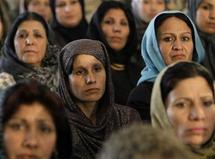
Afghan women were banned from working or getting an education under the Taliban regime which was overthrown in the 2001 US-led invasion of the country.
Wardak told the TES: "It is attitudinal change, it is behavioural change, it is cultural change.
"What I am hearing at the very upper policy level of the Taliban is that they are no more opposing education and also girls' education."
He added: "I hope, Inshallah, soon there will be a peaceful negotiation, a meaningful negotiation with our own opposition and that will not compromise at all the basic human rights and basic principles which have been guiding us to provide quality and balanced education to our people."
The minister, who spoke to the TES at the Education World Forum in London, claimed there had been significant shifts in attitude towards education since the Taliban was toppled and insisted that they would not be reversed.
"In the deepest pockets of our society, not only the Taliban, there was not very friendly behaviour with education," he said.
"That is the reason that in many provinces of Afghanistan we do not have either male or female teacher.
"During the Taliban era the percentage of girls of the one million students that we had was zero percent. The percentage of female teachers was zero per cent.
"Today 38 percent of our students and 30 percent of our teachers are female."
However, he conceded that Afghanistan had a huge task ahead. In more than 400 districts and urban centres in Afghanistan, 200 still have no girls enrolled in high school, he said.
In 245 districts there are no qualified female teachers.
The key to improving the situation was improving security, he said.
"We need to improve the security situation tomorrow.
"Of course that is our wish, and our vision, that there should be no more bloodshed in our country and there should be no school closed and no kid deprived of their basic human right of getting an education."
President Hamid Karzai said last year that almost half of school-age children in Afghanistan have no access to education, despite a seven-fold increase in the number attending school since the Taliban were ousted.
--------------------------------------------------------------------------------
Wardak told the TES: "It is attitudinal change, it is behavioural change, it is cultural change.
"What I am hearing at the very upper policy level of the Taliban is that they are no more opposing education and also girls' education."
He added: "I hope, Inshallah, soon there will be a peaceful negotiation, a meaningful negotiation with our own opposition and that will not compromise at all the basic human rights and basic principles which have been guiding us to provide quality and balanced education to our people."
The minister, who spoke to the TES at the Education World Forum in London, claimed there had been significant shifts in attitude towards education since the Taliban was toppled and insisted that they would not be reversed.
"In the deepest pockets of our society, not only the Taliban, there was not very friendly behaviour with education," he said.
"That is the reason that in many provinces of Afghanistan we do not have either male or female teacher.
"During the Taliban era the percentage of girls of the one million students that we had was zero percent. The percentage of female teachers was zero per cent.
"Today 38 percent of our students and 30 percent of our teachers are female."
However, he conceded that Afghanistan had a huge task ahead. In more than 400 districts and urban centres in Afghanistan, 200 still have no girls enrolled in high school, he said.
In 245 districts there are no qualified female teachers.
The key to improving the situation was improving security, he said.
"We need to improve the security situation tomorrow.
"Of course that is our wish, and our vision, that there should be no more bloodshed in our country and there should be no school closed and no kid deprived of their basic human right of getting an education."
President Hamid Karzai said last year that almost half of school-age children in Afghanistan have no access to education, despite a seven-fold increase in the number attending school since the Taliban were ousted.
--------------------------------------------------------------------------------









 Home
Home Politics
Politics









